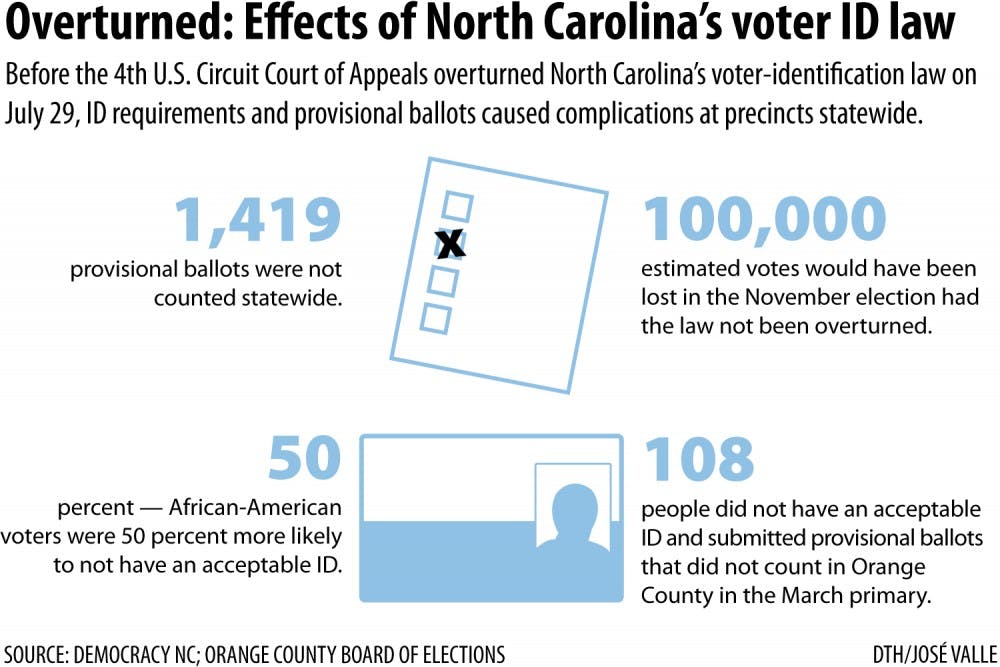Voting and accessibility
Reams said there were 108 people who voted with provisional ballots in Orange County during the March primary whose votes did not count because they didn't indicate any reasonable impediments. According to research by Democracy N.C., 1,419 total votes did not count across the state because people lacked an appropriate ID.
Laboy said that even if she had the time to get her provisional ballot, she wouldn’t have known what a reasonable impediment declaration was or that she could have filled it out. In addition, she said no one told her that her out-of-state ID would be unacceptable when she showed up to vote.
According to the law, the only way her out-of-state ID would’ve worked was if she had registered to vote within 90 days of the election. She said she registered more than five months in advance.
UNC senior Rebecca Hoffman spent the fall of 2015 registering UNC students to vote through the N.C. Public Interest Research Group. She said before the overturn, she always told students if they wanted to vote in 2016 they would need to bring an acceptable ID.
She said she doesn't see the overturn making much of a difference on the registration process, because an ID is not required to register to vote, but she supports eliminating barriers in the voting process.
"I think that the problem of voter fraud isn't something that justifies turning people away from the ballot if they don't have an ID," she said.
The confusions and complications Laboy experienced are why Matt Hughes, Orange County Democratic Party chairperson, believes the overturn will make voting easier and more accessible for people in Orange County.
“All of the constant, swift changes really mess with people’s ideas of if they can vote,” he said.
Hughes also said the overturn opens the doors for college students in the area who couldn’t do same-day registration under the previous law.
“We want people who are first-time voters to be able to vote in the easiest way possible,” he said. “We don’t want to make it hard. We don’t have to discourage people from carrying out a constitutional right.”
What's changing in Orange County
To get the day's news and headlines in your inbox each morning, sign up for our email newsletters.
Reams said the overturn will also impact early-voting and out-of-precinct voting in Orange County. Early voting will go from ten days (the requirement under the voter-ID law) back to 17, giving people an additional weekend to vote early.
Right now, Reams said the board is looking at four different plans for early-voting locations. Once the state board decides on a plan, she said, more information will be provided about locations and early voting in Orange County.
Hughes said increasing the weekend hours for early voting and allowing same-day registration will hopefully increase voter turnout as well.
“(The overturn) kind of resets things to the way they were, and I think it will really aid people in finding plenty of opportunities to vote, and not feeling as if they’re up against some sort of tactic that is designed to discourage them from voting,” he said.
Reams predicted that Election Day in Orange County will go faster and more efficiently since voters won’t need to show their IDs. Showing an ID was the third step required before voting, Reams said. The first two steps — stating your name and address — will remain in place.
To Board of Aldermen member Bethany Chaney, these two steps should have been the only ones ever required.
“You verify (your address) verbally with the person that asks, and that’s it,” she said. “There is no reason to prove it — that’s my perspective.”
Taking ownership of voting rights
Town of Chapel Hill Mayor Pam Hemminger said she hopes the overturn will make it easier for students to be a part of the voting process.
“I hope that with all the early voting changes, the timing is going to be different and there will be plenty of opportunities to vote,” she said.
But the law didn’t just disadvantage students. The court found that the North Carolina General Assembly made the law with discriminatory intent, disproportionately affecting African-American voters who, according to Democracy N.C., were 50 percent more likely to not have an acceptable ID than other voters.
“The bill was obviously aimed at people who traditionally vote Democrat," Chapel Hill Town Council member Jess Anderson said. "It was targeted, pretty bigoted, classist and racist.”
Though the ID requirement has been abolished, Chaney said it's critical that voters make sure their addresses are up to date for the general election. She said when people move and don’t update their address in the system, they won't be able to vote.
“If we don’t own our own registration, the state goes ahead and chips away at our rights,” she said. “We’ve got to take ownership about voter registration.”
@kianamcole
city@dailytarheel.com




